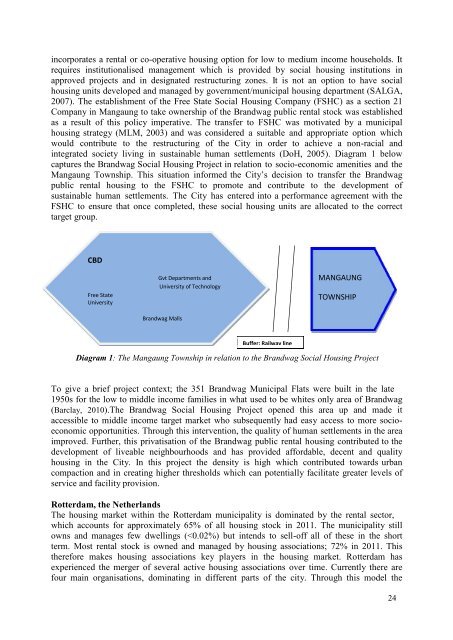ISBN: 978-0-620-54069-8 - Sustainable Human(e) Settlements: The ...
ISBN: 978-0-620-54069-8 - Sustainable Human(e) Settlements: The ...
ISBN: 978-0-620-54069-8 - Sustainable Human(e) Settlements: The ...
You also want an ePaper? Increase the reach of your titles
YUMPU automatically turns print PDFs into web optimized ePapers that Google loves.
incorporates a rental or co-operative housing option for low to medium income households. It<br />
requires institutionalised management which is provided by social housing institutions in<br />
approved projects and in designated restructuring zones. It is not an option to have social<br />
housing units developed and managed by government/municipal housing department (SALGA,<br />
2007). <strong>The</strong> establishment of the Free State Social Housing Company (FSHC) as a section 21<br />
Company in Mangaung to take ownership of the Brandwag public rental stock was established<br />
as a result of this policy imperative. <strong>The</strong> transfer to FSHC was motivated by a municipal<br />
housing strategy (MLM, 2003) and was considered a suitable and appropriate option which<br />
would contribute to the restructuring of the City in order to achieve a non-racial and<br />
integrated society living in sustainable human settlements (DoH, 2005). Diagram 1 below<br />
captures the Brandwag Social Housing Project in relation to socio-economic amenities and the<br />
Mangaung Township. This situation informed the City’s decision to transfer the Brandwag<br />
public rental housing to the FSHC to promote and contribute to the development of<br />
sustainable human settlements. <strong>The</strong> City has entered into a performance agreement with the<br />
FSHC to ensure that once completed, these social housing units are allocated to the correct<br />
target group.<br />
CBD<br />
Free State<br />
University<br />
Projec<br />
t<br />
Gvt Departments and<br />
University of Technology<br />
Brandwag Malls<br />
Buffer: Railway line<br />
MANGAUNG<br />
TOWNSHIP<br />
Diagram 1: <strong>The</strong> Mangaung Township in relation to the Brandwag Social Housing Project<br />
To give a brief project context; the 351 Brandwag Municipal Flats were built in the late<br />
1950s for the low to middle income families in what used to be whites only area of Brandwag<br />
(Barclay, 2010).<strong>The</strong> Brandwag Social Housing Project opened this area up and made it<br />
accessible to middle income target market who subsequently had easy access to more socioeconomic<br />
opportunities. Through this intervention, the quality of human settlements in the area<br />
improved. Further, this privatisation of the Brandwag public rental housing contributed to the<br />
development of liveable neighbourhoods and has provided affordable, decent and quality<br />
housing in the City. In this project the density is high which contributed towards urban<br />
compaction and in creating higher thresholds which can potentially facilitate greater levels of<br />
service and facility provision.<br />
Rotterdam, the Netherlands<br />
<strong>The</strong> housing market within the Rotterdam municipality is dominated by the rental sector,<br />
which accounts for approximately 65% of all housing stock in 2011. <strong>The</strong> municipality still<br />
owns and manages few dwellings (


